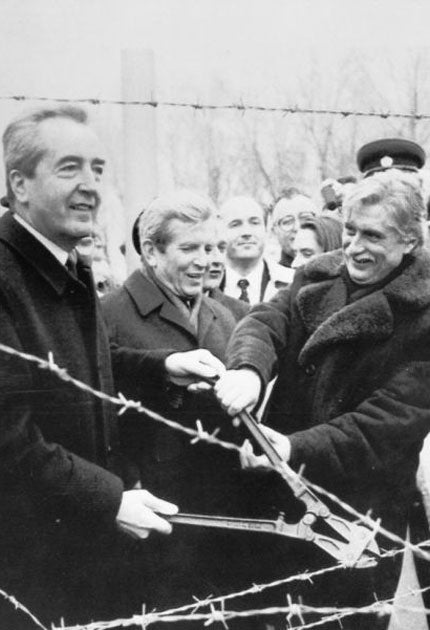Jirí Dienstbier: Czech politician who supported the ‘Prague Spring’ and served in his country’s first post-Communist government

Your support helps us to tell the story
From reproductive rights to climate change to Big Tech, The Independent is on the ground when the story is developing. Whether it's investigating the financials of Elon Musk's pro-Trump PAC or producing our latest documentary, 'The A Word', which shines a light on the American women fighting for reproductive rights, we know how important it is to parse out the facts from the messaging.
At such a critical moment in US history, we need reporters on the ground. Your donation allows us to keep sending journalists to speak to both sides of the story.
The Independent is trusted by Americans across the entire political spectrum. And unlike many other quality news outlets, we choose not to lock Americans out of our reporting and analysis with paywalls. We believe quality journalism should be available to everyone, paid for by those who can afford it.
Your support makes all the difference.Jirí Dienstbier was Czechoslovakia's first post-Communist foreign minister, who secured his place in history for his prominent part in the dissident movement, led by Václav Havel, that played a decisive role in the "velvet revolution" that peacefully overthrew the Prague Communist regime in 1989. From 1998 to 2001 he served as special rapporteur for the UN Human Rights Commission in the former Yugoslavia.
Jirí Dienstbier was born in 1937 in Kladno, a steel- and coal-mining town 30km west of Prague, into a family of civil servants. The town was a Communist stronghold and centre of anti-Nazi resistance. Dienstbier grew up under Nazi occupation and knew of its horrors at an early age. In June 1942, the nearby village of Lidice was razed by the Nazis. Its men were all killed and the women and children taken to Kladno, from where they went to concentration camps. Nazi propaganda openly, and proudly, announced the events in Lidice. Slave labourers from the Theresienstadt Jewish ghetto worked in Kladno's mines.
Dienstbier joined the Communist youth movement and studied philosophy at the Charles University of Prague. In 1958, aged 21, he wasadmitted to the Communist Partyand worked as a foreign correspondent, from 1960 to 1968, for Czechoslovak radio in the Far East, Soviet Union, Germany, France, and Yugoslavia. From 1968 to 1969 he was assigned to the United States. The nightmare of Stalinism was over and in Moscow, a "thaw" was taking place. Even so,Dienstbier broke the rules by conducting interviews which had not beenauthorised by his Communist bosses in Prague.
In 1968, the Czech Communist Party was taken over by reformers led by Alexander Dubcek, who, catching the mood of the majority of this educated country, inaugurated the liberalisations of the "Prague Spring". But in August of that year Leonid Brezhnev, who had replaced the more liberal Khrushchev, urged on by other hardliners, ordered the invasion of Czechoslovakia by Warsaw Pact forces. As a supporter of Dubcek, Dienstbier was expelled from the Communist Party and, in 1969, from the journalists' union, and dismissed from his job in radio. He could no longer pursue his profession and, like Dubcek himself, was forced to do a series of menial jobsincluding working in the archives of an engineering company and as a nightwatchman.
From 1979 to 1982 Dienstbier served a prison sentence for "anti-state" activities after signing Charter 77 and acting as spokesman for the human rights group initiated by the playwright Václav Havel, who was also arrested and imprisoned. Dienstbier acted as spokesman for the group once again, in 1985-86.
But the tide was turning against the Soviets, and, after the fall of the Berlin Wall in 1989, the Czech Communist Party announced that it would relinquish power and dismantle the single-party state. On 10 December, President Gustáv Husák appointed the first largely non-Communist government in Czechoslovakia since 1948, and himself resigned. Dubcek was elected speaker of the federal parliament and Havel president of Czechoslovakia.
Dienstbier was appointed foreign minister. Pictures of him went around the world as he and the Austrian foreign minister Alois Mock, and then his West German counterpart, Hans-Dietrich Genscher, cut the barbed wire between their respective states. Dienstbier served until 1992. In July 1991, he chaired the meeting of leaders of former Soviet bloc states which officially dissolved the Warsaw Pact.
Dienstbier returned to politics in 2008, when he became a member of the Senate as an independent candidate with the support of the leftist Social Democrats. He worked as a guest professor at several universities abroad and served on Prague city council.
Jirí Dienstbier, journalist and politician: born Kladno, Czechoslovakia 20 April 1937; married (one son, two daughters); died Prague 8 January 2011.
Join our commenting forum
Join thought-provoking conversations, follow other Independent readers and see their replies
Comments